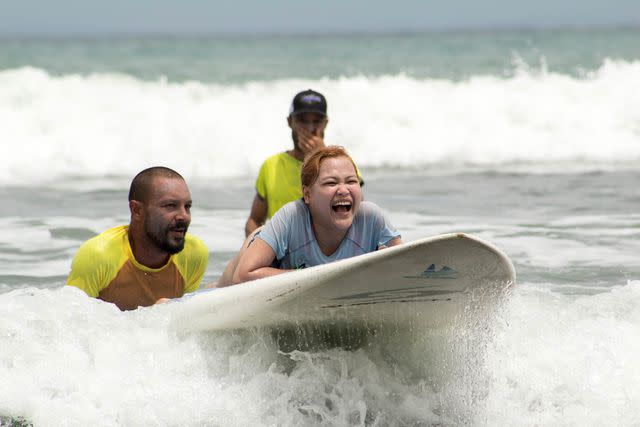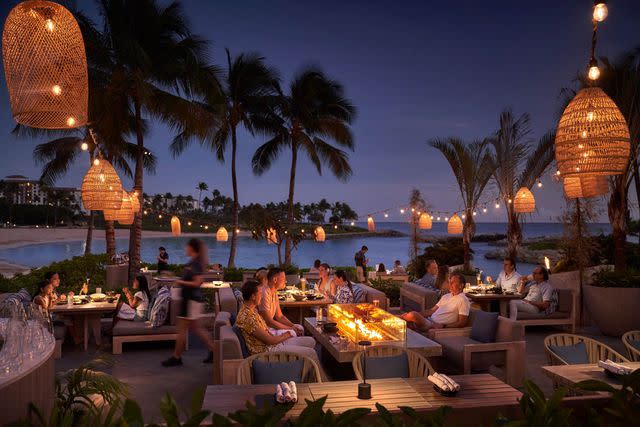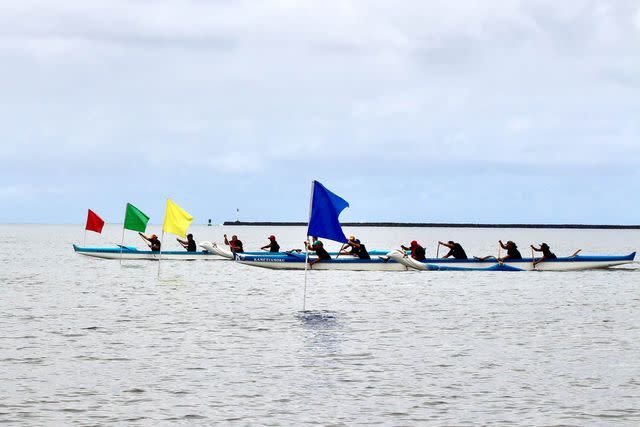4 Tips for Accessible and Inclusive Travel in Hawaii, According to a Traveler With a Disability
Here's how to plan a memorable trip to Hawaii.

Courtesy of Hilton Hawaiian Village
Not everyone has the luxury of spontaneity — to fly by the seat of their pants, booking last-minute trips and making plans as they go. For travelers with disabilities and chronic health conditions, advanced planning is crucial for safety and ease. I live with a neurological condition that, when triggered, can mimic the symptoms of a stroke. Here are my tips for accessible and inclusive travel in Hawaii.
Note small details make a big difference.
Ask questions before booking. For me, this means inquiring about potential triggers such as high altitude, as well as the physical demands of activities and emergency services, in the planning stages.
Asking questions upfront serves an additional purpose: It can help you weed out unqualified tour operators or properties. If they can't answer your questions or seem annoyed that you’ve inquired, that's a good indicator of their capacity for compassion and problem-solving.
Marika Devan, creator of Clumsy Girl Travels, recommends overplanning down to the smallest details: "Plan your transfer to and from the airport. Call tour operators to ask if their tour is accessible. Pick some restaurants you want to eat at and see if they are accessible." Even for a short trip to Hawaii, planning can mean gathering an overwhelming amount of information. Devan’s solution? Keep everything organized in a spreadsheet.
Enlist expert assistance.

Courtesy of Wheel The World
Work with an accessible travel provider such as Wheel the World or reach out to companies like The Arc of Hilo, a nonprofit organization on the Island of Hawaii (also referred to as the Big Island) that provides a range of services to people with disabilities. The latter aims to create more accessible experiences in a place where the rugged landscapes and remote location can be understandably intimidating to some travelers. "The island is rich with diverse adventures," says Robert Efford, CEO of The Arc of Hilo. "We want to help open up the Big Island to those who would love to travel here, but don’t know what they can and cannot access." (And if you’re headed for Hilo, SCP Hilo Hotel, a pet-friendly property that features locally made products, contributes to a number of causes, including beach cleanups. It also offers a swig of healthy Big Island Booch kombucha on arrival.)
You can also peruse the Go Hawaii website and reach out to the Hawaii Tourism Authority for suggestions.
Find an inclusive home base.
While all hotels in Hawaii must comply with the Americans With Disabilities Act (ADA) requirements, some go beyond the basics and strive to create a more inclusive environment. It’s worth asking about specific offerings and accommodations such as beach wheelchairs and on-site care (check out Kohala Coast Urgent Care, located at The Westin Hapuna Beach Resort, available for walk-ins as well as mobile services for room-bound visitors).
Enjoy on-site ocean views and sunset dining at properties such as Mina’s Fish House at Four Seasons Resort Oahu at Ko Olina, La Vie at The Ritz-Carlton Residences, Waikiki Beach (make a reservation for Friday night and watch the fireworks while dining on modern French cuisine made with local ingredients), Hualani’s Restaurant featuring a creative farm-to-fork menu at Timbers Kauai, and Huihui at Kā'anapali Beach Hotel (if you’re craving Hawaiian flavors, try the chef’s laulau).
Some properties make it possible to experience entertainment without the need to travel far. Hilton Hawaiian Village Waikiki Beach Resort, for example, is incredibly welcoming, with more than 80 shops and services, in addition to 18 restaurants, lounges, and bars — including several that offer live local music. You’ll also find local music at a number of other accessible venues across the state, including Tiki’s Grill & Bar at The Twin Fin and Queensbreak at the Waikiki Beach Marriott Resort & Spa, while others, like the Sheraton Maui Resort & Spa, provide wheelchair-accessible shuttles to entertainment hubs like Lahaina and Maui Nui Lū‘au.

Courtesy of Four Seasons
Many properties provide on-site cultural and educational programming, so be sure to inquire about complimentary and add-on activities that may be suited to your needs. Possibilities include stargazing at Turtle Bay Resort and Four Seasons Resort Maui at Wailea; woodcarving and manta talks at Mauna Kea Resort; paint and sip at Red Salt Restaurant at Ko’a Kea Resort; mai tai demonstrations at Waikiki Beach Marriott Resort & Spa; Hawaiian ribbon lei making at The Bay Club, Kings' Land, and Kohala Suites; ukulele lessons at Kā‘anapali Beach Hotel; sound healing and hula sessions at Four Seasons Resort Oahu at Ko Olina, and more.
Don’t forget to ask about pools and water sports. The Duke Kahanamoku lagoon at Hilton Hawaiian Village is an opportunity for travelers of varied abilities to experience Waikiki Beach's water activities. Because the lagoon is fed with ocean water, but separated from the ocean, it’s free of currents. Guests can try water sports such as stand-up paddling or kayaking, worry-free. Another option for those who want to snorkel, but prefer or require calm waters, is King’s Pond, a 1.8 million-gallon saltwater aquarium pool at the Four Seasons Resort Hualalai.
At Turtle Bay Resort, you may also have the chance to surf. "We have taken guests with special needs, including Blind guests, surfing," says Kaikea Elias, a former pro surfer and managing partner of the Jamie O’Brien Surf Experience at Turtle Bay Resort. "We are also able to offer guests who use a wheelchair customized surf lessons or SUP tours, based on individual needs."
Of course, you’ll find plenty of spots around the islands to relax at the pool and enjoy the view, like Prince Waikiki's adults-only, lift-accessible infinity pool.
If you’re seeking an elevated experience, Espacio is the spot. With just nine suites, service here is attentive and amenities are customized to each guest’s needs and can include private dinners, grocery delivery, and in-suite shopping, in addition to accessibility features such as TDD equipment, a private elevator, smart home technology, a private balcony with a jacuzzi, and more. The property’s on-site restaurant, Mugen, and private rooftop with sweeping ocean views are also accessible, providing opportunities for memorable experiences, like the rooftop Champagne & Caviar Hour and Mugen’s nine-course tasting menu.
Book accessible and inclusive adventures.

Julie Caron/Getty Images
Hawaii is a paradise for nature lovers and those interested in culture and history, and there are a variety of possibilities for experiencing the richness of the islands from mauka (toward the mountains) to makai (toward the ocean).
There are a number of accessible trails, including the Maunalaha on Oahu, Ohai on Maui, Ke Ala Hele Makalae on Kauai, and most of the Ha'akulamanu (Sulphur Banks) in Hawaii Volcanoes National Park on the Island of Hawaii. In addition, Hawaii Volcanoes National Park features a map in braille; ASL interpreters for planned programs, if requested a minimum of two weeks in advance; open-captioned films shown at the visitor center; and a wealth of 508-compliant online resources, including the new Mauna Loa story map. You can even overnight in the park at Volcano House and enjoy views of the Halema'uma'u Crater from the lodge and paved path (the lodge does not have an elevator, so request a ground floor ADA room, if needed).
Check AllTrails for more wheelchair-friendly trails, and contact state and national parks for the most up-to-date information on accessible experiences.
Or, consider guided tours to some of Hawaii’s most beloved sites, like Haleakalā on Maui, a favorite of Alvaro Silberstein, founder and CEO of Wheel the World. "Watching the sunrise from the summit of Haleakalā offers spectacular, otherworldly views and Hawaiian memories that will last a lifetime," he says. Wheel the World designed a Haleakalā sunrise tour that includes an interpretive guide and accessible transportation to make travel to this sacred site easier for those with mobility issues.
Driving tours offered by Kauai Hiking Tours provide access to some of Kauai’s colorful views, including Waimea Canyon and the Nā Pali Coast, to travelers who aren’t able to hike.
If you have historic sites on your list, reach out to them to confirm accessibility features. Silberstein suggests the Pearl Harbor National Memorial, which offers a number of accommodations for people with disabilities, including the wheelchair-accessible boat ride to the USS Arizona Memorial, as well as museum exhibits with wheelchair-accessible seating and hearing assistance devices.
If you’re keen on surfing or outrigger canoeing, Haben Girma, an author and disability rights lawyer, recommends AccesSurf. The Honolulu-based organization provides services and programming, including surf sessions, adaptive swim clinics, and canoe days, for people with disabilities.

Courtesy of The Arc of Hilo
The Arc of Hilo offers free paddling lessons from noon to 3 p.m. every Wednesday and Saturday for people with disabilities. With the help of sponsors, volunteers, experienced paddlers, and safety teams, the organization also held the first-ever inclusive Hilo Canoe Race in June 2022 and will host another one in June 2023. Visitors with disabilities are welcome to participate in the event, and spectators or athletes and can register on the Hilo Canoe Race site.
On Oahu, all-terrain wheelchairs are available at several beaches, including Ala Moana Beach Park, Hanauma Bay Nature Preserve, Kailua Beach Park, Kualoa Regional Park, and others. Contact the City and County of Honolulu, Department of Parks and Recreation at (808) 768-3027 to confirm availability.
On Kauai, all-terrain wheelchairs are available at some beaches, including Lydgate Beach Park, Poipu Beach Park, and Salt Pond Beach Park. Contact the County of Kauai, Department of Parks and Recreation at (808) 241-4460 to confirm prior to travel. For information on accessible beach parks on Maui and the Island of Hawaii, contact the respective Department of Parks and Recreation at (808) 270-6138 and (808) 961-8311.

Courtesy of Maui Ocean Center
Those eager to learn what’s under the sea will find accessible experiences at Maui Ocean Center. The aquarium and oceanography center includes exhibits featuring living corals and endemic marine life, a 54-foot-long underwater tunnel surrounded by sharks and rays, a "Humpbacks of Hawaii" exhibit, and a wheelchair-accessible viewing area at Turtle Lagoon. Additionally, visitors can find braille signs throughout the park.
For more Travel & Leisure news, make sure to sign up for our newsletter!
Read the original article on Travel & Leisure.


